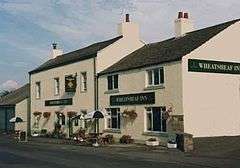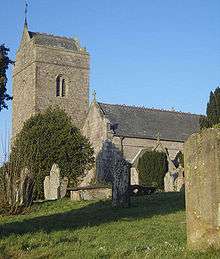Brigham, Cumbria
The village of Brigham, near the town of Cockermouth, Cumbria, England, has existed as a settlement since neolithic times. It is located just outside the Lake District National Park.
| Brigham | |
|---|---|
 The former Wheatsheaf Inn public house, Brigham | |
 Brigham Location within Cumbria | |
| Population | 756 (2011 census)[1] |
| OS grid reference | NY085303 |
| Civil parish |
|
| District | |
| Shire county | |
| Region | |
| Country | England |
| Sovereign state | United Kingdom |
| Post town | COCKERMOUTH |
| Postcode district | CA13 |
| Dialling code | 01900 |
| Police | Cumbria |
| Fire | Cumbria |
| Ambulance | North West |
| UK Parliament | |
History
Brigham was an early centre of Christianity in Cumbria. The church of St Bridget's, was originally a Norman building, and is situated at the far north of the village, known as Low Brigham; it contains several fragments of pre-Norman crosses and other early carved stones. A disused quarry is situated in the centre of the village, above which runs the main street of High Brigham. The quarry is bisected by the road called Stang Lonning.
Until the closure of the Cockermouth and Workington Railway in 1966, Brigham had a railway station. At one time there was also a second station serving the hamlet of Broughton Cross, 1 km west of the main village.
The village gave its name to HMS Brigham, a Ham class minesweeper. The ship's bell from this vessel is now in St Bridget's Church of England primary school in the village. Until a more modern fire alarm system was installed, this bell was rung as the fire alarm for the school.
The family of Bounty mutineer Fletcher Christian are buried in the graveyard at St. Bridget's. Fletcher himself, born and raised in the township of Eaglesfield within Brigham parish, and christened at St. Bridget's, is thought to be buried on Pitcairn Island, though some have claimed that he returned secretly to England.
Community
The village has its own Church of England primary school; St. Bridget's, with just over 100 pupils. There is no longer a Post Office in Brigham, there is still a social club. Brigham used to have 3 local pubs which some have now been transformed into houses, only one remains. Newer housing estates known as High Rigg and The Hill are at the west and east of the village.
Etymology
'Brigham' is 'homestead near the bridge'. 'Brycg' is OE (Old English) for 'bridge'; 'hām' is OE for 'village', 'homestead'. [2]
Governance
Brigham is part of the Workington constituency for UK parliament. The current Member of Parliament for the Workington constituency is Sue Hayman, who is a member of the Labour Party.[3] The Labour Party has won the seat in the constituency in every general election since 1979. The Conservative Party has only been elected once in Workington since World War 2, at the 1976 Workington by-election.[4]
For Local Government purposes it's in the Broughton St Bridget's Ward of Allerdale Borough Council. This ward stretches north to Bridekirk with a total population at the 2011 Census of 4,178.[5]
Brigham is part of the Cockermouth South Division of Cumbria County Council.
The village has its own parish council, Brigham Parish Council.[6]
See also
References
- "Parish population 2011". Retrieved 16 June 2015.
- Armstrong, A. M.; Mawer, A.; Stenton, F. M.; Dickens, B. (1950). The place-names of Cumberland. English Place-Name Society, vol.xxi. Part 2. Cambridge: Cambridge University Press. p. 355.
- "Allerdale Borough Council website". Archived from the original on 7 April 2012. Retrieved 4 April 2012.
- "A vision of Britain website – general elections section". Retrieved 27 April 2012.
- "Ward population 2011". Retrieved 16 June 2015.
- "Brigham Parish Council".
Further reading
David Bradbury (compiler), "Pages From Brigham's History" Whitehaven, Past Presented (2008) ISBN 978-1-904367-33-8
External links
- Cumbria County History Trust: Brigham (nb: provisional research only - see Talk page)

